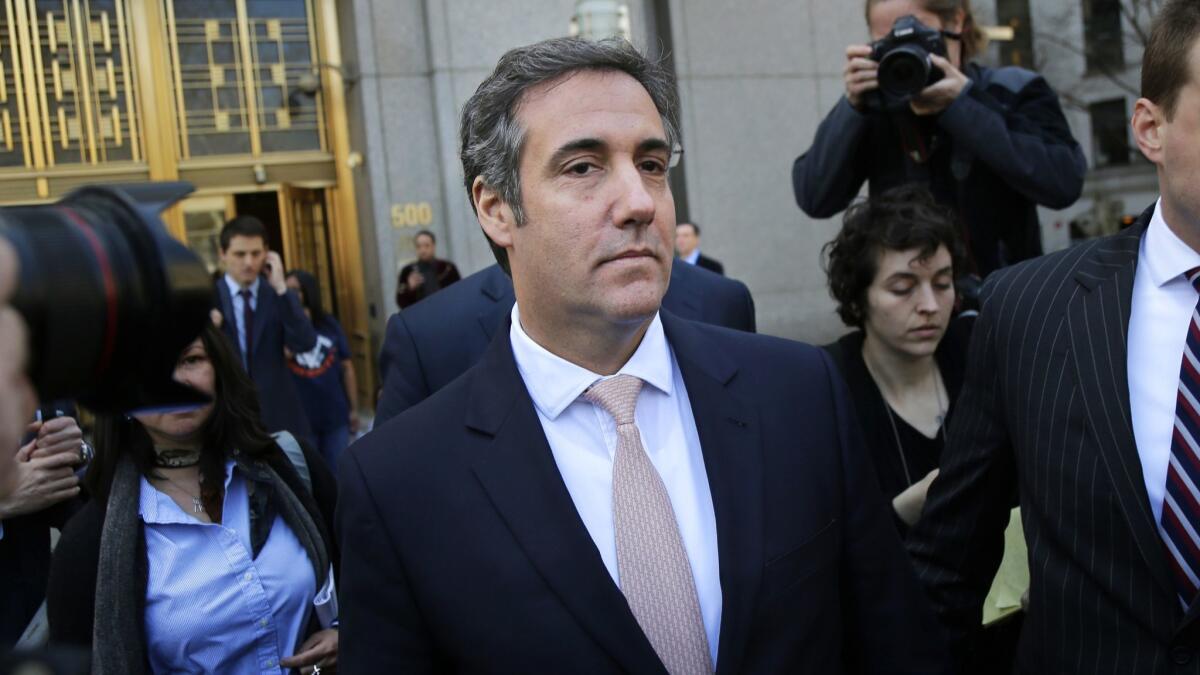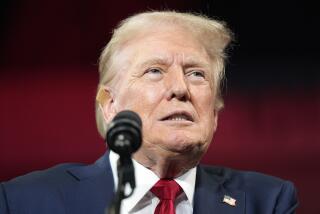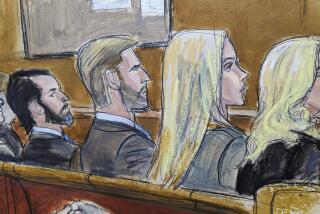Did Trump’s new lawyer Giuliani make things worse for the president? Here’s why some think so
Reporting from Washington — President Trump and his new legal point man, former New York Mayor Rudolph W. Giuliani, are off to an explosive start together, admitting what Trump had only recently denied — that he reimbursed his personal lawyer for hush money paid to a porn actress before the election.
The question roiling Washington, ever since Giuliani disclosed the stunner late Wednesday, is “Why?”
If the new version of events was meant to reduce Trump’s legal liability, the success of the strategy seemed in doubt on Thursday. Some legal experts say Giuliani may even have made things worse, not only for the president but also for Michael Cohen, the lawyer who paid Stormy Daniels $130,000 shortly before the 2016 election to stay quiet about an alleged sexual liaison with Trump.
“What you see here is a real effort to cover this up, and the story keeps shifting,” said Larry Noble, former general counsel of the Federal Election Commission.
One central issue, legal experts say, is whether the payments amounted to a campaign expense — despite Trump and Giuliani’s denials — to silence an alleged paramour of the candidate and avoid alienating voters. The nondisclosure agreement with Daniels came as the campaign already was contending with the furor over Trump’s boasts suggesting sexual assault that were recorded as he prepared for an “Access Hollywood” television appearance a decade earlier.
By saying in tweets early Thursday that he paid the legal settlement with Daniels, Trump may be trying to protect his attorney from charges that Cohen violated federal reporting requirements and limits on campaign donations. Trump associates worry whether Cohen, who is under FBI investigation in New York, will remain loyal to the president as prosecutors seek the lawyer’s cooperation.
Giuliani did not materially improve the president’s position. But he may have materially made it worse. It’s mystifying to me.
— Jonathan Turley, George Washington University law professor
Yet Trump, by acknowledging he paid the money, is raising new political questions about his honesty and new legal questions about his own failure to comply with federal law and disclose the payments either on campaign finance filings or his personal financial disclosures.
Legal experts noted that if the $130,000 was intended as a campaign loan from Cohen to Trump, that should have been disclosed.
“Giuliani did not materially improve the president’s position. But he may have materially made it worse,” said Jonathan Turley, a George Washington University law professor. “It’s mystifying to me.”
Cohen’s preelection role in quashing a potential political problem, once a salacious sideline to the Justice Department’s inquiry into possible Trump campaign collusion with Russia and Trump’s potential obstruction of the investigation, has taken on added significance with the recent developments.
Cohen’s office, residence and hotel room were raided last month by the FBI, suggesting that federal agents could have evidence of payments from Trump. Giuliani and Trump may have been anticipating that, and trying to get ahead of any disclosure.

Last month, in his first public statement about Daniels, the president told reporters on Air Force One that he knew nothing of the payments. “You’ll have to ask Michael Cohen. Michael’s my attorney,” he said then.
Trump said last week on “Fox & Friends” that Cohen had represented him in the Daniels matter, though he gave no details. The White House has denied that Trump had a one-night stand with her in 2006, as she contends.
Beginning Wednesday night on Fox News, Giuliani gave a series of interviews in which he conceded that Trump reimbursed Cohen through “retainer” payments of $35,000 apiece over several months, giving Cohen “a little profit and a little margin for paying taxes.”
Giuliani told the New York Times that the total paid to Cohen since the end of the campaign was between $460,000 and $470,000, but he did not account for the money spent beyond Daniels’ $130,000, raising another question about the purpose of those payments.
Trump, in his tweets, called the nondisclosure agreement “a private contract between two parties,” unrelated to the campaign — the sort of thing “very common among celebrities and people of wealth.” He again denied he and Daniels had a sexual liaison and said he would pursue damages against her for “false and extortionist accusations.”
But [Trump] did know about the general arrangement, that Michael would take care of things like this.
— Rudolph W. Giuliani
Giuliani denied in interviews that the payments were an effort to help Trump’s campaign, insisting they were intended to protect his marriage and reputation from Daniels’ allegations. Yet Giuliani undermined that argument by saying on “Fox & Friends” Thursday morning, “Imagine if that came out on Oct. 15, 2016, in the middle of the, you know, last debate with Hillary Clinton.”
“Cohen didn’t even ask” Trump, Giuliani said. “Cohen made it go away. He did his job.”
It remained unclear exactly what Trump knew about Cohen’s dealings with Daniels, and when Giuliani, in his Thursday interview on Fox, said the president “didn’t know the details of this” until “a couple weeks ago, maybe 10 days ago” — a timeline that could account for Trump’s previous denial and failure to report the expenditures.
“But he did know about the general arrangement, that Michael would take care of things like this,” Giuliani told Fox host Sean Hannity during Wednesday’s interview.
Cohen has said he borrowed money to pay Daniels through a home equity line of credit, and his lawyer has said Cohen wasn’t repaid. By spending personal funds, without reimbursement, he could be liable for violating the federal cap on campaign donations, which was $2,700 per candidate in 2016, and Trump’s campaign could face trouble for failing to disclose them as contributions.
Federal enforcement, however, is notably lax and slow-moving. The FEC typically treats omissions in campaign disclosure reports as civil violations that sometimes result in fines.
But Trump’s admission that he reimbursed Cohen could result in criminal charges if prosecutors believed the two men had a “knowing and willful intent” to conceal spending intended to influence the election, Noble said.
“What they did was pay $130,000 to Stormy Daniels to stop her from going public right before the election, because they were afraid it was going to hurt [Trump’s] chances in the election,” Noble said.
Stephen Spaulding, a former FEC lawyer who is chief of strategy at the ethics watchdog group Common Cause, called Trump and Cohen’s handling of the matter a textbook example of a potentially criminal coverup more serious than the underlying offense.
“Rudy Giuliani has only made the situation worse for both the president and Michael Cohen,” Spaulding said.
Common Cause has filed complaints with both the FEC and the Justice Department arguing that the payment to Daniels was an illegal campaign contribution.
Separately, another public-interest advocacy group, Citizens for Responsibility and Ethics in Washington, has filed a complaint to the Justice Department alleging that if the president knew he owed Cohen money, he violated federal law by failing to report the debt on his 2016 personal finance disclosure. Federal law requires officials to list outstanding liabilities over $10,000. Trump signed his report in June 2017, months after Giuliani said the president started to make monthly payments to Cohen.
“He had this six-figure debt that he is paying off in chunks month to month — that is exactly how a loan works,” said Jordan Libowitz, a spokesman for the group. “If he knew that liability was there, that could be a potentially criminal false statement.”
Daniels, whose real name is Stephanie Clifford, is suing Trump in Los Angeles federal court to void the nondisclosure agreement barring her from discussing her alleged one-night stand with Trump. She argues, among other things, that the pact is invalid because its purpose was to break federal law by hiding from voters a $130,000 payment made to influence the election.
Daniels’ lawyer, Michael Avenatti, said the revelations that Trump reimbursed Cohen expose the president to criminal liability for potential money laundering and fraud. “This is a bombshell,” Avenatti told CNN.
White House Press Secretary Sarah Huckabee Sanders said the new information caught her by surprise and she referred most questions about it to Giuliani.
The news about Trump’s payments over a porn star made for an awkward Rose Garden celebration of the National Day of Prayer on Thursday. Trump signed a new order creating a religious liberty advisor, a move aimed at pleasing conservative evangelical supporters who have stuck with him through prior sexual allegations. Some were in the audience.
“Isn’t it a glorious day?” Vice President Mike Pence said to the audience, proceeding to characterize the White House as a place of prayer, and reading a Bible verse.
Trump pointed to the crowd and raised his fists. “Our nation will be renewed by hard work, a lot of intelligence and prayer,” he said.
Times staff writer Chris Megerian contributed to this report.
Follow the latest news of the Trump administration on Essential Washington »
[email protected] | Twitter: @noahbierman
[email protected] | Twitter: @finneganLAT
[email protected] | Twitter: @jtanfani
More to Read
Get the L.A. Times Politics newsletter
Deeply reported insights into legislation, politics and policy from Sacramento, Washington and beyond. In your inbox three times per week.
You may occasionally receive promotional content from the Los Angeles Times.













